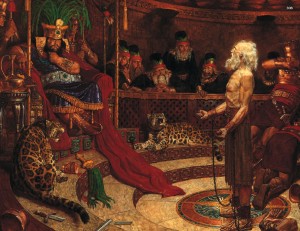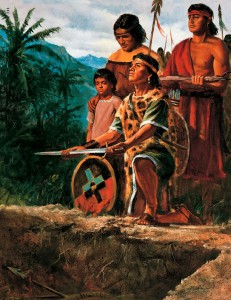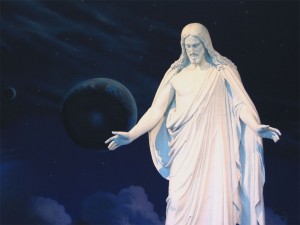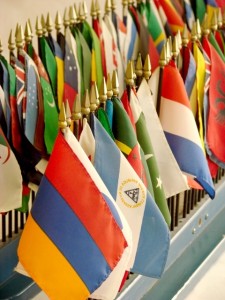In a previous post, I recounted briefly the story of the first part of the Book of Mormon. Now, I would like to outline more of what happens in the book.
 At the beginning of the book of Mosiah (circa 121 BC), the people of Nephi and Zarahemla had recently merged together to form a single society, ruled by the righteous Nephite kings, Mosiah, his son Benjamin and later by grandson Mosiah. During the time of the first Mosiah, a group had left to return to the city that Nephi himself had founded.
At the beginning of the book of Mosiah (circa 121 BC), the people of Nephi and Zarahemla had recently merged together to form a single society, ruled by the righteous Nephite kings, Mosiah, his son Benjamin and later by grandson Mosiah. During the time of the first Mosiah, a group had left to return to the city that Nephi himself had founded.
For three generations they lived there and three kings ruled during that time. Zeniff, the first of those kigns, made a treaty with the Lamanites in the land and gained use of the city of Nephi. He and his people were righteous and grew and defended themselves against the eventual Lamanites offensive.
Zeniff’s son, Noah, ruled after his father but was self-indulgent and ruined the kingdom through corruption and immorality. A prophet named Abinadi testified of Jesus Christ against Noah but was put to death (see picture above). Abinadi’s influence caused Alma, one of Noah’s priests, to see the error of his ways and so he began to secretly teach the people about Christ. Alma’s followers were true believers of Christ and were forced to flee when Noah sent his army to destroy them. Noah was soon displaced when the Lamanites overran their city and he was killed by his own people.
His son, Limhi, ruled over the conquered people who were forced to pay tribute of half of all they had to the Lamanites. After several unsuccessful battles, Limhi emptied the city and fled to Zarahemla. Alma and his people also found their way back to Zarahemla. Both groups were guided in their escape through the power of the Lord.
Now in one body in the land of Zarahemla, Alma received permission from king Mosiah (the second) to organize a church and became the chief priest. Years later when Mosiah needed an heir to the throne, none of his sons were willing to be king because they left to become missionaries to the Lamanites. Without an heir, Mosiah created a system of laws and elected judges to govern the people after he died.
Alma’s son, Alma (a.k.a. Alma-the-Younger), who was the chief priest of the Church after his father, was selected to be the first chief judge over all the land. In that position, he watched the dealings of the people. He executed a militant false prophet (Alma 1), defended his people against insurrectionists as well as Lamanites and then stepped down from his political office to teach the people as the chief priest (religious office) where he still guided the religious aspect of the people. As priest, he selected teachers, silenced anti-Christs (literally, Alma 30)and set right the affairs of the Church for many years.
 During this time, the missionary sons of Mosiah had been teaching the Lamanite people about Jesus Christ. Due to some very miraculous events, thousands had come to have faith in Him, burying their weapons of war in order to have peace (Alma 24:15-19). Their conversion invoked the anger of others who did not believe. To avoid prolonged conflict, the Lamanites who believed in the gospel of Jesus Christ left their homes and settled in a land that the Nephites gave them.
During this time, the missionary sons of Mosiah had been teaching the Lamanite people about Jesus Christ. Due to some very miraculous events, thousands had come to have faith in Him, burying their weapons of war in order to have peace (Alma 24:15-19). Their conversion invoked the anger of others who did not believe. To avoid prolonged conflict, the Lamanites who believed in the gospel of Jesus Christ left their homes and settled in a land that the Nephites gave them.
Throughout the entire story, various rebellious groups became unsatisfied with Nephite religion and way of life and so went to the Lamanites to cause them to form an army to fight the Nephites. This happened several times, particularly with the case of a man named Amalickiah, who caused a twelve year long war (Alma 46 through Alma 62) between Lamanites and Nephites. The Nephite people grew over the years, spreading out and covering more land. A secret society of robbers and assassins was formed in their midst which was never completely extinguished for almost a hundred years. The Nephites grew wicked and righteous in cycles and Lamanites were converted to believe in Jesus Christ at various times.
It is important to understand that all throughout the Book of Mormon, there were prophets of God among the people. Those prophets always testified of Christ. They saw His coming and told the people about the signs of His birth. The righteous believers of Christ understood His purpose in their own lives and the Atonement. Thus, by revelation from God, the people had access to a correct view of what was to happen and what their role in life was. Today, there is a prophet on the earth and that same opportunity to access the same spirit that guided the Nephites anciently.
“And now, behold, I will testify unto you of myself that these things are true. Behold, I say unto you, that I do know that Christ shall come among the children of men, to take upon him the transgressions of his people, and that he shall atone for the sins of the world; for the Lord God hath spoken it.” —Alma
This synopsis is continued in part 3.



